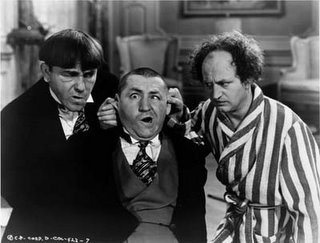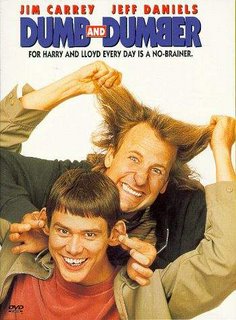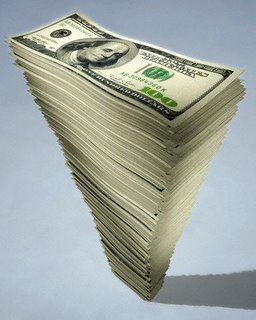 HSA
HSA -
a tax advantaged savings plan available to taxpayers in the United States to deposit money to pay for current and future medical expenses. Money can be deposited to a special savings account before tax is paid on it (or deducted later from one's gross income when income taxes are filed). The money can be used tax-free for medical expenses, chiefly one's medical insurance deductible and co-insurance (the amount after which the insurance begins to pay, but less than the amount at which they pay 100% of expenses.) It is unique in the tax code as both income tax deductible on deposit and tax-free on withdrawal (for medical expense).Okay, in layman’s terms. Instead of having blanket coverage for as much medical care as somebody wants, they are basically put on a debit system. When I was at UPenn, my meal plan was effectively an all-you-can-eat system analogous to today's HMO's. Whereas my wife had a debit plan at Boston College. She actually paid for every hamburger and salad separately, with the bonus that she could keep any unspent balance.
It works for food and everything else in life, and it will thrive in healthcare. (I will get to the
Moronic Naysayers soon enough.)
Remember in my
previous blog I listed the 4 major reasons why healthcare is expensive:
1) Medicare
2) Third Party Payer system
3) Medical innovation aimed at marginal rather than substantial cost savings.
4) Malpractice costs from trial lawyers.
I’d bet my bottom dollar that
1) and
2) are far and away the biggest problems. Now, does Medicare dwarf the Third Party Payer Issue?
In other words, does rapidly growing Medicare enrollment (from Baby Boomers) introduce so much dumb money and inefficiency that it supersedes the waste from the Third Party Payer problem?
Who knows? But what I do know is that Health Savings accounts can really put a dent into the main, if not only, issue of healthcare –
COST.
It is a very simple fact that the main problem with healthcare is COST but all too often
Morons get sidetracked into derivative or even peripheral issues.
Socialists want nationalized healthcare because they want everything nationalized.
Class warfare advocates relentlessly try to make healthcare into a poverty issue. They cite the number of uninsured constantly but never link that to COST and definitely don’t want to examine the roots of said COST.
These same two groups like to wield healthcare as a business-bashing talking point.
The
Obesity-Police pile on the healthcare issue to indict the fast food industry.
Perma-Naysayers in
Big Media use the rising cost of care to impugn the gamut of its own preferred enemies – which these days constitute large corporations (besides themselves), drug companies, and personal political foes like President Bush.
I want to expand on this concept of
MISFRAMING and even
IGNORING the pertinent issues of healthcare.

Consider my recent conversation with a Stanford PhD scientist and an Ivy League educated teacher. The first part is slightly off-topic but has its own inherent entertainment value.
CaptiousNut – What do you think is wrong with public school education?
Ivy Leaguer – People need to recognize the social problems.
CaptiousNut – Like what?
Ivy Leaguer – A hungry kid at school can’t concentrate in class…
CaptiousNut – Well, what about the free lunches? Millions of kids get them.
Ivy Leaguer – It’s not enough.
CaptiousNut – There are also millions of kids that get free breakfast? What are you talking about? No one is starving in school.
Ivy Leaguer – (no answer)
CaptiousNut – I thought poor kids are “obese” these days?
Ivy Leaguer – THEY ARE.
CaptiousNut – How can they be starving 5 days a week in school yet end up obese? I have no idea what you are talking about.
(Enter self-evident Moron #2)
PhD Scientist – It’s about healthcare. No one can afford healthcare. Parents are working so much JUST to afford healthcare that they can’t be home to help their kids with school work?
CaptiousNut – Are you kidding me? (He was dead serious. At this point I knew I had some blog material.)
PhD Scientist – If we had socialized medicine...then education would improve drastically.
These two Morons provide a powerful reminder that Stanford PhD’s and Ivy Leaguers aren’t necessarily all very intelligent. I never assumed they were but too many other people reflexively think that “Dr.” or “Harvard” next to someone’s name automatically implies superior mental competence.
So this PhD Moron thinks public education blows because of some convoluted connection to healthcare. Remember healthcare costs 73% more now than it did in 2000. So would the PhD Moron claim that public education was substantially better 5 year ago when healthcare was cheaper?
I doubt it. Five years ago he was probably blaming a different scapegoat du jour. Next year he will blame oil companies and $3 gasoline for failing government schools.
But this guy illustrates my point that intelligent healthcare dialogue is hampered by all sorts of Moronic misdirection. Just like economic reality, Morons think healthcare is a subjective issue they can contort to suit any overriding agendas.
Devil’s Advocate: Maybe the “Morons” just don’t understand much about healthcare?
That is definitely true, but they compound their ignorance by propagating healthcare canards and contaminating the public dialogue. For that, they need to be Marginalized.

President Bush was expected to tout Health Savings Accounts in his State of the Union Address and the Perma-Commi Naysayers predictably disseminated their spin beforehand.
On the Monday before the speech, CNBC reminded me again why I barely watch it anymore. One of their reporters blathered,
“HSA's will shift more of the burden on to the consumer and off the employer...”
“Some companies will try to force these on their employees...”
Then they had some professor weigh in with his “expert” Naysaying opinion. The Moron said,
“ (HSA’s) won’t reduce medical costs because most of medical spending is on the sickest and would be past the deductible amount... it won’t reduce the number of un-insured.”
Okay, one canard at a time. The “burden” of healthcare falls on both the worker and the employer yet Commi-NBC just doesn’t get it. When healthcare costs rise, both worker and employer suffer. A company that spends less on healthcare can increase wages, hire more people, and presumably insure them. It is astoundingly ignorant for CNBC to keep framing the healthcare issue as simply a one-sided burden.
“Some companies will force these on their employees…..”
First of all, my wife’s company was supposed to offer an HSA to us this year but for some reason held back. I am exceedingly pissed about that. I will explain later on in more detail, but employees will be lucky to get HSA's “forced” on them.
But again, CNBC clangs the bell of socialist class warfare. In their paradigm, workers are constantly exploited, impotent to do anything about it, and the chronic victims of evil management.
Then, true to their template methodology, they bring in an “expert” to claim that Health Savings Accounts won’t be effective at reducing the number of uninsured. I will debunk this later on.
The New York Times, robot propagandist that it is, also had to weigh in on HSA's before the State of the Union address. I guess it was their attempt at a preemptive rebuttal.
Excerpts reprinted with neither permission nor expressed written consent of the NY Times. Red denotes my emphasis. Blue denotes my commentary. (If link doesn't work, try this.)

Savings Accounts for Health Costs Attract Wall Street
By ERIC DASH
Published: January 27, 2006
Banks, credit unions and money management firms are now quietly positioning themselves to become central players in the business of health care, offering 401(k)-type accounts to cover future medical expenses.
Bank of America, J. P. Morgan Chase, Fidelity Investments and hundreds of others are hoping to capitalize on the latest wrinkle in medical care paid by consumers: health savings accounts, which have been around since 2003 but are moving to the fore of the national agenda in anticipation of the State of the Union address on Tuesday.
They are the centerpiece of President Bush's plans on health care, just as private accounts were offered as a Social Security fix.
Banks and others are drawn by the promise of lucrative fees they can generate by offering consumers mutual funds and other investment vehicles as their account balances grow. Most also charge $50 to $75 to set up a health savings account, and they collect perhaps $40 or more each year in maintenance charges and service fees.
($40- $75 is lucrative? I guess the NYT thinks there are no administrative costs to setting up an account.)
To be sure, health savings accounts will make up only a small fraction of earnings at a financial giant like Citigroup. But at a time when deposit growth has slowed and higher interest rates have hurt profits, they represent a steady stream of new income that is increasingly hard to find. Banks are betting that what the administration calls consumer-directed health care catches on.
Supporters say that the discipline and marketing might of financial services giants could spur the adoption of consumer-directed care. Critics argue that the banking industry's involvement only bolsters their case: the accounts are more about wealth than health.
"We already have a large number of retirement savings vehicles in the United States," said Jonathan Gruber, an economist and Treasury Department official in the Clinton administration. "It is not clear why we need yet another tax break for savings for rich guys."
(Don't the non-rich benefit from HSA's as well?)
Corporations, of course, want relief from soaring health care costs, and have been steadily shifting more of the burden to their employees. Small businesses were among the first to offer health savings accounts to their employees. But over the last year or so, a number of big companies — from Guidant to Wal-Mart Stores — have started signing up.
(The Times will slam Wal-Mart any chance it gets.)
Health savings accounts are akin to the private accounts that were proposed to help overhaul Social Security. Much of Wall Street liked private retirement accounts, but their support was guarded because they feared a potential negative reaction.
(Sneaky, conniving Wall Street - afraid to admit what they like.)
Banking lobbyists have met with White House officials at least three times over the last year to discuss the rules governing health savings vehicles. But until recently, most have been shy about their interest in such plans. Now, they have established a lobbying group, the H.S.A. Council, and are spending millions of dollars to roll the plans out.
(What, the NYT isn’t a multi-million dollar lobbying group? Actually they do over $3 billion in annual revenue.)
For wealthier people, the tax break could provide a generous incentive to build a nest egg for future health care; poorer people with smaller annual contributions could wind up spending all the money they put away during the year.
The savings accounts, in effect, give financial institutions a vital, but behind-the-scenes role in shaping the nation's health care system.
Banks hope to use their close ties with their customers to enter the health insurance market. For now, they collaborate with insurance providers as much as they compete. Health savings accounts must be opened in conjunction with a high-deductible health insurance plan. After choosing an insurance policy, the consumer must pick a bank.
Even though the health plan and savings account are separate products, big banks and insurance companies pitch them together as an "integrated solution" and split the fees. Health insurers keep the premiums; banks retain the investment management fees and the debit card transaction fees.
Even without the lucrative investment management fees, bank executives like Daniel Kelly, manager of H.S.A. services at U.S. Bancorp, say health savings accounts are attractive. Banks make money each time a customer swipes his debit card at a doctor's office. Payment processing alone could generate some $2.3 billion over the next five years, the DiamondCluster study estimates.
($2.3 billion over five years? That is not a lot of money considering the size of the banking industry, but earning any amount of money is incriminating in the NYT's estimation.)
"This has nothing to do with an assets-under-management play," said John M. Prince, chief executive of Exante Financial Services. "There will be huge falloff in people who are trying to play that role. Eighty percent of the money are assets [sic] that go right in and go right out."
Just a few years ago, the idea that the titans of health care and banking would be battling for business would have been nearly impossible to imagine.
Industry lobbyists viewed the idea as a health care issue; they raised questions about its prospects of passing as the 2004 presidential race heated up. Banking executives did not see the profit potential after an experiment with Medical Savings Accounts, aimed at small businesses, failed.
"Put it this way, the impact of this law did not really become clear to them until after it passed," said Mr. Perrin, the H.S.A. Coalition director. Once they understood how the accounts worked, however, the big banks realized the next I.R.A. had landed at their feet.
Now, some financial institutions are urging the Bush administration and Congress to raise the tax-deductible contribution limit to encourage consumers to put more money in their accounts — a proposal that President Bush is expected to endorse in his State of the Union speech.
Banks are already champing at the bit. "We happen to be in the camp that the H.S.A. is a second retirement account to be used for medical expenses," said Nancy Todor, an executive who will oversee health savings accounts when Citigroup introduces them this year.
All things considered this was a pretty tame article from the Times. It was a more subtle hit piece than some of the others I have fisked. Consider the substance of the article again by noting the following buzzwords, aptly in Commi red font:
quietly positioning
capitalize
lucrative fees
banking industry's involvement is more about wealth than health
rich guys
Corporations
want relief from soaring health care costs
shifting more of the burden to their employees
Wal-Mart Stores
Wall Street liked private retirement accounts
lobbyists
lobbying group
spending millions of dollars
wealthier people
poorer people wind up spending all the money
behind-the-scenes role
collaborate
split the fees
lucrative investment management fees
make money
titans
profit potential
Banks are champing at the bit
The Times wants to drill home the idea that Health Savings Accounts are a devious plot to enrich Wall Street and its incestuous cousin Corporate America. They completely illustrate my point that Big Media treats Americans' healthcare as a purely subjective issue.
This article brings no substantive discussion to the healthcare dialogue whatsoever. It is just more anti-business propaganda and cynicism. To Sulzberger and his acolytes, banks are simply evil. Never mind that they facilitate mortgages, business loans, school loans, and in general lubricate the economy, if they are making or conspiring to make money, there must be something underhanded about them.
Again, any worthwhile healthcare discussion should be focused on COST, of which there is clearly no mention. The Times won't even get its hands dirty with any specific analysis of HSA's. No, the Times instead opts to stir a pot of innuendo portraying HSA's as just another vehicle that enriches corporate America and impoverishes the "little guy".
While on this Commi agenda junket, they miss the point completely.
HSA's ARE EXTREMELY BENEFICIAL FOR EVERYONE - ESPECIALLY THE IMPOVERISHED "LITTLE GUY".
I mentioned above that I was eager to switch from an HMO to an HSA - let me explain why.
First of all, I haven't been to a doctor in 4.5 years. That would be great if I could have the eight or nine thousand bucks I spent on premiums back. It would probably be more than that, given some interest and appreciation. Now on to the mechanics of HSA's.
Assume that I do have an HSA and have to go see a doctor tomorrow for a routine checkup. Say he charges me $125 that I pay out of pocket. Now I have two choices,
1) Go grab $125 out of my HSA to reimburse myself immediately.
or
2) Save the receipt and for HSA reimbursement later on.
I WOULD EXERCISE OPTION 2) EVERY SINGLE TIME.
Here is the key with HSA's - there is no time limit on reimbursements. So I could let the money grow tax-free for 30 years before reimbursing myself.
In thirty years, $125 compounded tax-free at a conservative 5% ends up being $540.
So here I am at 65 years old and I start writing myself reimbursement checks from my HSA. I match them up with receipts and I have now got some tax-free income.
IN FACT, IF POSSIBLE I WOULD NEVER TAKE A NICKEL OUT OF MY HSA.
Devil's Advocate: So the NY Times was right, this is more about wealth than health...
Didn't I rename you Simpleton's Advocate?
A person needs wealth to pay for their health, numbnuts. This is what you socialists don't understand. If you care about the poor, you should be obsessed with giving people the tools to create wealth.
People need a lot of money to live on from age 65 to death. They won't be working, will need more medical care and likely even money for a nursing home or other long term care facility.
In a world with millions of HSA holders, the elderly will be able to pay for much of this themselves.
In a world devoid of such a vehicle, who is going to pay for this care? The government? The only way they can pay it is by taxing younger productive people who need to be saving that money for own their retirement and healthcare needs.
DA, if you are a straight up Communist who thinks that those who work and save should simply hand their money over to those who don't or didn't, please say so. Otherwise you're sentencing the "poor" to government dependency for their last three decades of life. How is it compassionate to deny anyone the means to create wealth and their own financial dependency?
Of course the New York Times uses "wealth" as if it was a four-lettered word and econo-illiterates across the country all sheepishly nod their empty heads. In fact, all the Times thinks it needs to do is say that dirty word, list the evil banks poised to benefit, and then bask in the contentment of a sufficient rebuttal.
Now this is a rather muted article for the Times and that is mostly because the HSA law is already a fait accompli. Ergo, there aren't a bunch of invertebrate pols reading the Times with their fingers in the air - at least on this issue.
Now back to a substantive discussion of the HSA.
So how exactly does the HSA help the "little guy"?
As I already said, it gives him a tax advantaged way to save money for his lifetime of healthcare needs. This alone suffices to do more for the "little guy" than snarky Big Media HSA bashing but it has even more benefits than that.
In a world of HSA's, consumers realize they will keep every penny they don't spend and there will be a huge drop-off in the demand for many components of medical care.
Hmmm...Let's see, it costs me $150 to go for a regular checkup, get my heart listened to, stand in my boxers, and get weighed?
I think I, and many others, will start skipping that.

And people (like one of my friends) will stop going to the emergency room for migraine headaches. Pharmaceutical consumption will take a dive when people start weighing the money against the perceived benefits for many of these ineffective drugs.
Devil's Advocate: What do you mean "ineffective" drugs?
Something like 40% of drugs don't work. Let me explain before you pill poppers blow a gasket. Prozac has lost tests against sugar pills. I've been prescribed Vioxx, Celebrex, Neurontin, and other crap for my bad back and none of them worked. Sure they may work for others, but there are hundreds of thousands of people taking medication that simply does not improve their health.
Then there are the people that think they can eat that pepperoni pizza because they are now on Lipitor. What the heck, it is much easier to take a pill than adjust your diet and/or hit the treadmill.
And fueling this over-indulgent pharma-dependency is a system where neither the doctor nor the patient pays the full cost of usage. Again, HSA's will make the pill popper think long and hard about the cost-effectiveness of prescribed drugs.
HSA proliferation will take a big bite out of drug spending because people will start to realize that a "diet rich in fiber and soy protein" is just as efficacious as Lipitor. And that realization will really boost their HSA account.
Needless trips to the doctor, less spending on drugs and treatment... all lead to a lower demand for medical care.
Lower demand leads to lower prices.
Lower prices mean that more people can afford healthcare - (i.e. fewer un-insured for you Morons).
Lower prices mean that evil corporations can hire more people and expand their business.
More business profits mean more tax revenue that the pols can squander on different programs.
EVERYBODY WINS.
Devil's Advocate: Okay, but why not make HSA's available to only poor people?
First of all, that is class warfare kind of talk. Who is going to determine who is rich and who isn't? What if someone grows up poor and then later becomes rich? There will likely be bunch of Commi's trying to penalize this person in their golden years. You hear it now with people clamoring to deny Social Security checks to the so-called "rich". By the same token, what about a person who is rich but becomes impoverished as they age? Under your plan, they would be denied the means to save their entire life and be left with little money to pay for healthcare in their later years.
Still if class warfare is your unshakeable religion, I will provide the purely economic argument against denying the "rich" HSA accounts.
When the dreaded "rich" people use HSA's, they will cut back on their unnecessary and ineffective care as I described above. Their reduction in demand contributes to the lower price of healthcare for everyone (i.e. the "poor" too). Taking away the HSA option from the "rich" effectively raises the price for the "poor". This is why only econo-illiterates can eat up this class warfare crap. They mistakenly assume that any perceived benefit for the "rich" automatically worsens the plight of the "poor".
They couldn't be more wrong.

Need less theoretical argumentation?
Consider plasma televisions. If the dreaded "rich" weren't buying them at $15-$20,000 a few years ago, technology companies would never have gotten the money to invest, streamline, and innovate that drove plasmas down to the more affordable prices of $2000-$3000 where they are today for the "little" people.
This is called CAPITALISM. Perhaps you may have heard of it. It should be taught next to reading, writing, and arithmetic but unfortunately is not.
Now, on to CNBC's "expert" academic who said that,
“ (HSA’s) won’t reduce medical costs because most of medical spending is on the sickest and would be past the deductible amount... it won’t reduce the number of un-insured.”
First off, this is a classic Perma-Naysaying sound-byte polemic. You can see how long this post on HSA's is. They are not a simple thing that can be debunked so glibly.
It is kind of like saying that high end homes won't depreciate because there will always be rich people to buy them. Obviously this is pure nonsense.
HSA's are dynamic vehicles that will effect far-reaching changes on consumer behavior. This Naysaying "expert" is ignoring more than a few things. First, he is ignoring the huge contribution of blockbuster drugs to the cost of healthcare. I read something like 50% of the past five years healthcare inflation is due entirely to about a dozen new drugs. Included in them are the aforementioned Lipitor (which can be replaced by soy diets) and Prozac (that loses tests against sugar pill placebos).
This huge amount of spending just on new drugs seems at odds with the "expert's" assertion that "most of medical spending is on the sickest". Also remember what I have said in past blogs about these demand parsers - that 9 times of 10, they are econo-illiterates trying to promulgate political propaganda.
Devil's Advocate: You are busted C-Nut. You just tried to call the "expert" a demand parser but that is exactly what you just did when you skipped from the total cost of healthcare to the recent healthcare inflation rate.
Knucklehead, I didn't demand parse, I changed to the more appropriate metric. It is the escalating inflation in healthcare costs that needs to be addressed. The more expensive medical care gets, the fewer that can afford it, etc.
The "expert" is the one that wants to misdirect the debate and I am just taking the dialogue back on track. Saying that we spend the most money on the sickest is tautological bovine excrement. Of course we do. This "sickest" are the ones that need the care. Should we spend the most money on the healthiest instead?
It's like when these Morons say stuff like,
"...the poor have no money..." or "...the poor can't afford..."
Who could possibly disagree that the poor lack money? It is a debating ruse to get the listener in a state of initial agreement and then pull them further into whatever BS the Moron is peddling.
Now I mentioned above that HSA's are dynamic in the sense that they alter consumptive behavior. Here another blogger eloquently lands the crippling blow on CNBC's "expert".
Even really sick people can have choices. Very heroic (and expensive) measures are taken in end of life care. Pretending that everyone were responsible for their own health costs for a moment, if I had a terminal condition, and had a choice between spending the last month in the ICU or not bankrupting my family, I know which I would choose. Now if someone else is picking up that tab... As a society, we have no problem bankrupting the healthcare system with these kinds of choices when we have no direct responsibility.
Amen, fellow blogger.
CNBC, the New York Times, and their comrades in Big Media are incapable of objectively discussing almost anything, never mind a free market concept like Health Savings Accounts. Lucky for everyone that today the anti-agitprop is available on the web.

Right now a family of four can put $5,450 into an HSA each year. Assume that the maximum contribution amount grows 1% per year. Now remember, I am going to put the money in and never take a nickel out. I will invest it in stocks and bonds. After 30 years of growth:
A 5% annual return would yield a balance of $405,220.
A 7% annual return would yield a balance of $569,016.
A 9% annual return would yield a balance of $812,038.
Remember those annual contributions were tax-deductible, they grew and compounded tax-free, and you should have a bunch of receipts saved up that you can reimburse yourself with, also tax-free.
Furthermore, I am pretty sure you can bequeath it.
Big Media may have stalled Social Security reform, but they completely missed this one.








